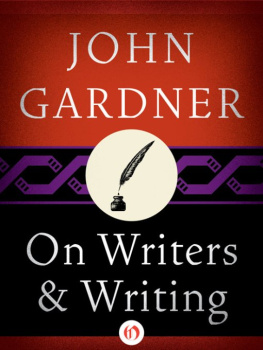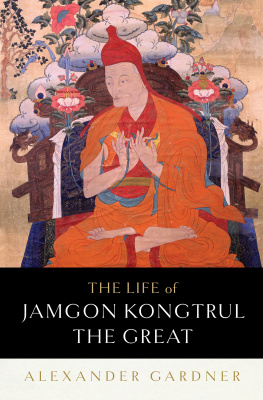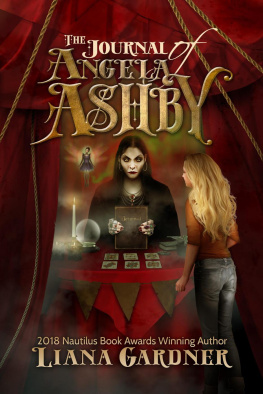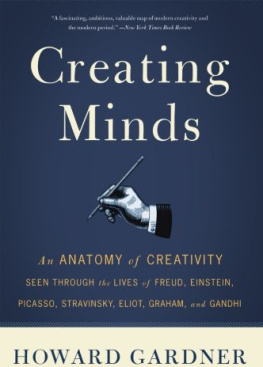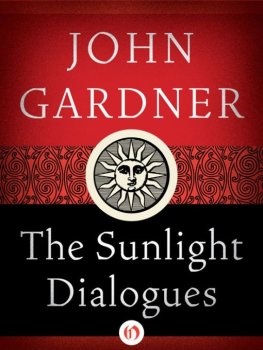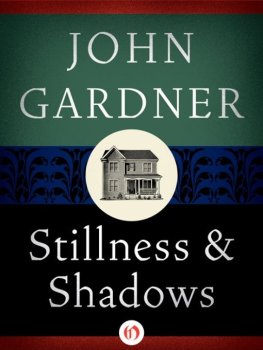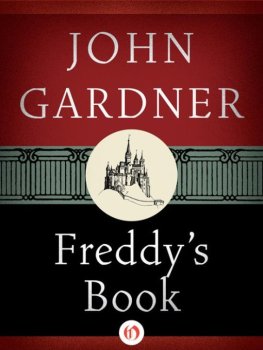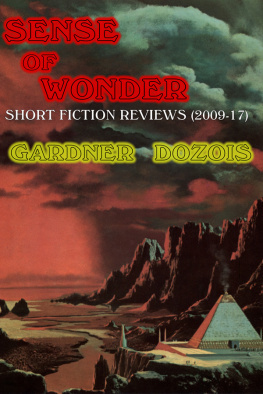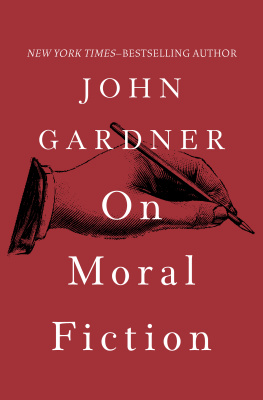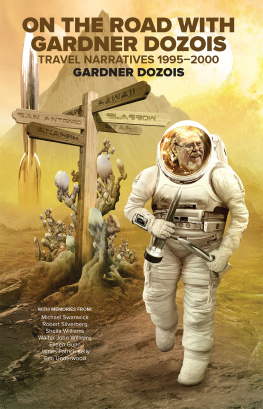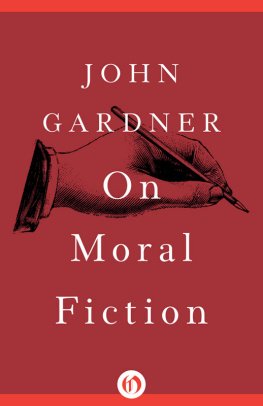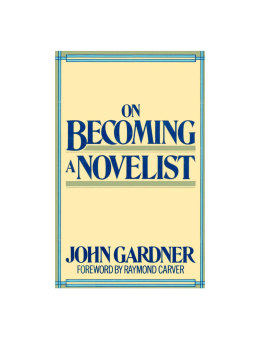On Writers and Writing
John Gardner

C ONTENTS
Bartleby:
Art and Social
Commitment
I N BARTLEBY, MAN LOOKS AT MAN, ARTIST looks at artist, and God looks at God. To understand that the narrator is at least as right as Bartleby, both on the surface and on symbolic levels, is to understand the remarkable interpenetration of form and content in the story. Most Melville readers have noticed that on one level, Bartleby can represent the honest artist: he is a scrivener who refuses to copy, as Melville himself refused to copythat is, as he refused to knock out more saleable South Seas romances. But if Bartleby is the artist, he is the artist manqu: his is a vision not of life but of death; the man of silence, he creates nothing. A better kind of artist is the lawyer, who, having seen reality through Bartlebys eyes, has turned to literature. Nor is he the slick writer: If I pleased, he says, [I] could relate divers histories, at which good-natured gentlemen might smile, and sentimental souls might weep. That is, popular fiction. The phrase If I pleased is significant: please is the narrators substitution, later, for Bartlebys infectious prefer. Like Bartleby, the narrator does what he prefers to dobut within certain reasonable limits. The reader may weep or smile at Bartlebys story, but the narrators chief reason for choosing it is that he is seriously concerned with literature. Close reading reveals that the story he tells is indeed a highly organized literary work, a story that is as much the narrators as it is Bartlebys, ending with the narrators achievement of that depth of understanding necessary to the telling of the story.
An important part of what the narrator at last understands is the conflict between the individual and society. The individual feels certain preferences which, taken together, establish his personal identity; society makes simultaneously necessary and unreasonable demands which modify individual identity. Thus the individuals view of himself and the view others have of him can become two quite different things separated by a substantial wall (communication is difficult); thus, too, the socialized mans identity and his view of his identity can be walled apart (self-knowledge is difficult). And mans dilemma cannot be resolved, for if one insists on ones own preferences and thereby affirms ones identity, one finds oneself, like Bartleby, walled off from society and communion with other men; and on the other hand, if one gives in to the necessary laws of social action, one finds oneself, like Bartlebys employer, walled off from active obedience to the higher laws of self and, in a sense, reality. Wall Street is the prison in which all men live.
The conflict between the rule of individual preference and the necessary laws of social action takes various forms in Bartleby. Conflicts arise between individual and social impulses within each of the first three scriveners, Turkey, Nippers, and Ginger Nut, and also between individual traits in the scriveners and the necessary requirements of their employer, whose commitment is perforce social, for he must do his job well to survive. But for the action of the story, the most important conflicts are those rooted in the relationship of the lawyer and Bartleby, that is, the conflicts between employer and employee, between the lawyers kindly nature and his recognition of the reasonableness of societys harsh demands, and between Bartleby and the world.
In many ways the lawyer and Bartleby differ. The lawyer is a successful, essentially practical man with highly developed feelings for social position (he mentions coyly that he was not unemployed by John Jacob Astor), the value of his money (the office of Master in Chancery is pleasantly remunerative), common usage and common sense, and above all, as he tells us John Jacob Astor has observed, prudence and method. Bartleby, on the other hand, is merely a clerk with an obscure past, a man little concerned with practicality in the ordinary sense, and apparently quite uninterested in social position, money, or usage and sense. He is totally lacking in prudence he courts dismissal at every turnand for method he relies on preference, often preference at present. The narrator at first cannot understand Bartleby, for good reason, and Bartleby prefers not to understand the narrator or the society the narrator represents. At the same time, the two characters are in some respects similar. Early in the story, the narrator tells us, I am a man who, from his youth upwards, has been filled with a profound conviction that the easiest way of life is the best; and Bartleby shares the narrators profound conviction: what he cannot share is the narrators opinion that the easiest way must be socially acceptable, or even reasonable. The narrator is also like Bartleby in that he does not seek public applause; but Bartleby goes further, he does not avoid public censure. Finally, the narrator is decorous and eminently safe; so is Bartleby: the narrator is positive that Bartleby would not copy in shirtsleeves or on Sunday, and the narrator has singular confidence in his honesty.
Perhaps partly because the narrator and Bartleby are both different and similar, the conflict between them triggers a conflict within the narrators mind. He knows that as employer he has the authority to make demands of a scrivener, whatever the scriveners preference, for if employers cannot function as employers, society cannot work; but despite his knowledge, the narrator cannot bring himself to force Bartleby to obey or get out. When Bartleby first refuses to comply with a request, the narrator merely thinks, This is very strange What had one best do? and, being pressed by business, goes on with his work. When Bartleby refuses to comply with another request, the narrator is shaken and for a moment doubts the assumption behind employer-employee relations. When Bartleby uses it as a modus operandi, the narrators opinion that the easiest way of life is the best conflicts with his equally firm opinion that the laws of social action are of necessity right; and in his momentary uncertainty the narrator turns to his office, a miniature society, for a ruling. Even their ruling is not much help, however, for to act on it would be to become involved in unpleasantness, and this the narrator would prefer to avoid in favor of some easier wayif any is to be found. Once again he avoids the issue, in the socially approved way, by turning his mind to his work.
Bartelbys unconventional insistence on his preferences, and his indifference to the demands of his social setting, the office, leads the narrator to wonder about him, that is, to want to understand him. He watches Bartleby narrowly and finds him more enigmatic than before. Bartleby never seems to leave, he exists on ginger nuts, and in the miniature society of the office his corner remains a hermitage. Judgment cannot account for the man, and though imagination provides delicious self-approval, it too fails to provide understanding. The conflict in the narrators mind between acceptance of Bartleby as enigmatic eccentric, on one hand, and insistence on Bartlebys position as employee, on the other, leads to no action while the narrator is in a charitable mood; but when he is not, he feels a need to force Bartleby into revealing himself actively, not just passivelythat is, to make himself vulnerable by showing some angry spark answerable to my own. The narrators goading excites the other scriveners, but it cannot reach Bartleby. At last, for the sake of keeping peace in the office, and also because some of Bartlebys preferences coincide with the preferences of society (his steadiness, his freedom from all dissipation, his incessant industry), the narrator comes to accept Bartleby, and the narrators internal conflict is temporarily resolved.
Next page
